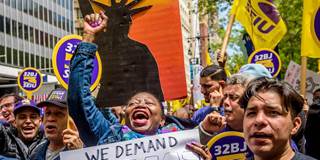In November 2016, even as Donald Trump was winning the presidency, minimum-wage increases passed in Arizona, Colorado, Maine, and Washington by margins of 10-18 percentage points. And this year, initiatives for democratic reforms are in the process of being qualified across the country.
BERKELEY – You’ve probably heard this before: Markets are soaring, and wealth is growing, but most of the gains are going to those at the top. Rapid technological advances are transforming daily life and creating new industries, but are also fueling anxiety about lost jobs and occupations. People are increasingly angry at giant corporations’ perceived monopolistic power. Cities are thriving as magnets for the wealthy and ambitious, but rural residents often feel left behind. Anti-immigrant sentiment has become intense, and sometimes violent. Women are challenging male power in viral protests. Political corruption is fueling widespread fury, with many convinced that moneyed interests have captured their democratic institutions. Trust in political parties is at new lows. And amid all the dismay and dysfunction, some of the new plutocrats have stepped up as philanthropists to underwrite social reform.
Yes, it all sounds like Trump-era America. But these conditions also prevailed more than a century ago, during the Progressive Era of the early 1900s.
Disgusted by the massive inequalities of the Gilded Age, the first Progressives sought comprehensive reform. Changes to the US Constitution adopted during this period include the introduction of the federal income tax with the Sixteenth Amendment, direct election of senators with the Seventeenth Amendment, the prohibition of alcohol with the Eighteenth Amendment (some ideas were really bad), and women’s suffrage with the Nineteenth Amendment.

BERKELEY – You’ve probably heard this before: Markets are soaring, and wealth is growing, but most of the gains are going to those at the top. Rapid technological advances are transforming daily life and creating new industries, but are also fueling anxiety about lost jobs and occupations. People are increasingly angry at giant corporations’ perceived monopolistic power. Cities are thriving as magnets for the wealthy and ambitious, but rural residents often feel left behind. Anti-immigrant sentiment has become intense, and sometimes violent. Women are challenging male power in viral protests. Political corruption is fueling widespread fury, with many convinced that moneyed interests have captured their democratic institutions. Trust in political parties is at new lows. And amid all the dismay and dysfunction, some of the new plutocrats have stepped up as philanthropists to underwrite social reform.
Yes, it all sounds like Trump-era America. But these conditions also prevailed more than a century ago, during the Progressive Era of the early 1900s.
Disgusted by the massive inequalities of the Gilded Age, the first Progressives sought comprehensive reform. Changes to the US Constitution adopted during this period include the introduction of the federal income tax with the Sixteenth Amendment, direct election of senators with the Seventeenth Amendment, the prohibition of alcohol with the Eighteenth Amendment (some ideas were really bad), and women’s suffrage with the Nineteenth Amendment.